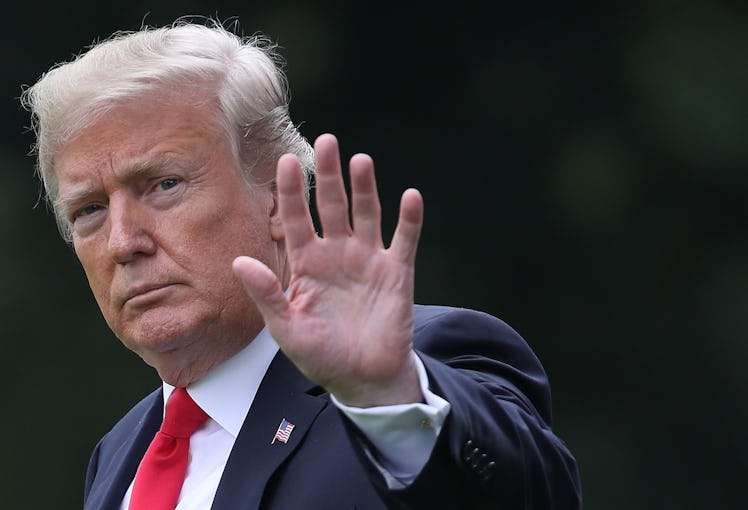
Donald Trump Said Photo IDs Are Required To Buy Groceries & Um, Nope
On July 31, Donald Trump attended a rally in Tampa, FL to support Florida Rep. Ron DeSantis. However, it's no surprise that Trump had to slip in his plans for the remainder of 2018, and Donald Trump's comment about voter ID laws has everyone face palming right now. We'll see what comes from this.
During the July 31 rally, Donald Trump attempted to talk up stricter voter ID laws by arguing that photo IDs are required when purchasing groceries. Um, not quite.
“You know if you go out and you want to buy groceries, you need a picture on a card,” Trump said during a campaign rally. “You need ID. You go out and you want to buy anything, you need ID and you need your picture."
He seemed to be trying to make the argument that you need to have an ID for your every day life, but it didn't really work out, because no, you don't need an ID to buy groceries. To be fair, there are some times when a store will ask for ID — if you're paying with an unsigned credit card, or if you're buying restricted items like beer, cigarettes, or certain kinds of medication — but I personally have never been ID'd while mindlessly buying a pint of ice cream or milk at the grocery store. Trump's statement came as he was listing examples of when Americans need to present authorized photo identification, but the groceries argument might have missed the mark this time around.
The rally also included a discussion of other topics including tariffs and unemployment rates, but it was Trump's grocery faux-pas that definitely stole the show.
Donald Trump has been pushing for stricter voter ID laws throughout his presidential campaign and presidency. Despite the controversy surrounding the topic, voter identification laws have spread quickly over the past 10 years alone. According to The Washington Post, no states required photo identification to vote on Election Day before 2006. However, as of August 2018, 10 states have implemented voter identification laws and 33 states have some form of identification laws in place. But it's not uncontroversial. A number of Democratic politicians and activists, such as former presidential candidate Bernie Sanders, have criticized voter ID laws as intended to suppress voter turnout among minority communities. This sudden increase in voting laws is due in large part to the 2013 Supreme Court ruling that struck down the Voting Rights Act of 1965, which allowed nine states, mostly Southern, to change their election laws without federal approval.
In February 2017, The Washington Post conducted a study comparing the change in voter turnout among minority communities when these laws were in place. Through their study, they found that minority communities were less likely to turn out to vote if these ID laws are implemented, and and the numbers are staggering. According to The Post's study, Hispanic communities were impacted the most, with 7 percent less turnout for the general election with these laws in place. African-American, Asian, and multiracial communities also were impacted through these identification laws, while white communities were the least affected.
In a time where voting is more important than ever, this pattern of limited minority voter turnout might end up benefitting the GOP. History has shown that minority communities often tend to vote for the Democratic party as opposed to the Republican party. Just take Wisconsin as an example, where a voter identification law had a major impact on voting turnout within its state. According to a September report from The New York Times, the November 2016 turnout in Wisconsin was less than 70 percent, which is the lowest in presidential history since 2000 — a turnout which a University of Wisconsin study found was heavily affected by voter ID laws. In the end, Trump barely beat out competitor Hillary Clinton in Wisconsin by only 22,748 votes.
Today's political climate is proving itself to be one of the most heated ones in history. November midterm elections are approaching, everyone. Don't forget to vote.